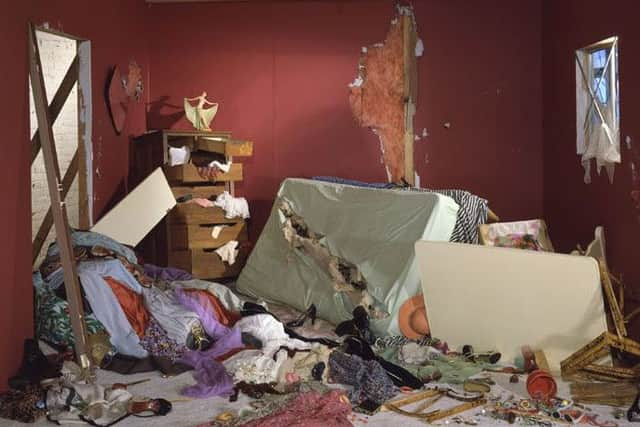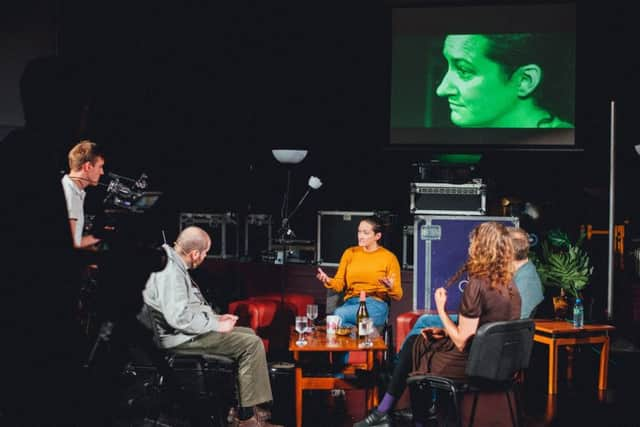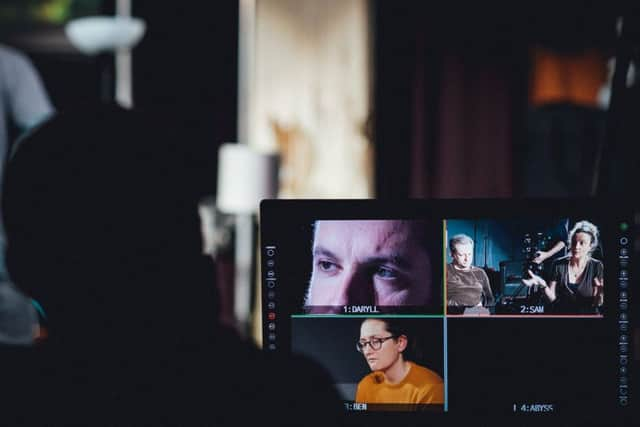The Destroyed Room, the panel show that tears down convention


IT STARTED with a room. Or, at least, a photograph of a room. Vanishing Point’s new show takes its name from Jeff Wall’s iconic photograph of a destroyed bedroom, which featured on the cover of Sonic Youth’s album of the same name. Its power lies in a kind of latent dramatic energy: what happened here, and why?
But as with all the company’s work, this is only the starting point of a process. The kind of innovative theatre with which Vanishing Point has been identified since 1999 begins not with a script but with a provocation, a set of questions. Then, through a process of researching, wrangling and rehearsing, a show is created to explore them. No two shows are the same: part of the challenge is to find a form uniquely appropriate to the content.
Advertisement
Hide AdWhen I catch up with artistic director Matthew Lenton, the creative force behind the company, he is in the thick of that process. The room of Wall’s photograph has become another room: a theatre in which the three guests on a panel chew over the events of the day among potted plants and standard lamps. Cameras circle, beaming their movements and expressions on to a big screen. The audience watch both the live action and the film.


“It started with that image, and the question of what happened in that room, but now the room has taken on a more metaphorical value,” Lenton says. “We’re not going to see a destroyed room on the stage, and there’s no literal mystery of what happened in that room, but it’s still about what leads to a point of destruction.”
There is plenty of destruction in the content of the discussion – war in Syria, the bodies of asylum seekers washed up on Mediterranean beaches – but it happens at a distance. Lenton is interested in what happens when the suffering of others is beamed into our “room” through an increasingly wide range of media: does it make us more compassionate, or more able to switch off? How do we perceive these events, and do they change us? As the cameras circle and the wine flows, the guards start to drop and the tone in the room starts to change.
“At one point, we looked at After Dark [an open-ended live discussion programme broadcast by Channel 4]. It would just go on into the early hours of the morning until someone decided to slowly fade down. There was a sense that anything could happen, like when Oliver Reed got drunk and kissed feminist academic Kate Millett, and Teresa Gorman MP stormed off after an argument with Billy Bragg. The intellectual conversation was taken over by the events that happen in the time and the space.
“It feels like this show inhabits a very fine landscape, there’s a delicate balance in the journey from the beginning to the end. This is a show that talks about the way that we perceive things through media. The cameras examine people’s behaviour in a microscopic way. How does a person’s behaviour change when they know they’re being watched – and when they’re no longer aware that they’re being watched? Is someone being emotionally truthful or not, and how can we tell?”


For actors Elicia Daly, Pauline Goldsmith and Barnaby Power, the challenge lies in playing both to a live audience and to a camera at the same time. But for Lenton, this is part of the meat of the show: he is asking questions about how experience is mediated, while showing his audience live and recorded action at the same time. The one place where this can happen is in the theatre. “The arts does have a serious role to play in interpreting the world around us,” he says. “More and more of the time, we’re getting stage adaptations of Harry Potter, and it’s getting harder to justify theatre that has a serious role to play, so I think that position has to be defended.”
Advertisement
Hide AdLenton is not afraid to tackle uncompromising subjects in his work. Vanishing Point’s 2012 show Wonderland for the Edinburgh International Festival explored the issues around internet pornography, Tomorrow, made in 2014 and brought back for last year’s Fringe, was a robust, poignant look at dementia. On The Destroyed Room, he says: “Part of me was interested in the question of: what use does fictionalising something do any more? We’re living in a world which is so surrounded by ‘reality’ that, in a way, it feels glib to fictionalise serious things. I was interested in saying to an audience: come and see this piece of theatre, it’s going to be a bunch of people talking and debating, and we’re saying that’s theatre because we don’t want to diminish something by fictionalising it.”
Lenton says theatre offers a place where views can be aired and discussed, even unpopular ones. “Do we let every refugee in who wants to come in? If we do that, we’re going to let some people in who we don’t want to have in. Do we get to even choose? Should we just let people come in because they need to come in? Or, on the opposite side, does there come a point where we have to say ‘no’?
Advertisement
Hide Ad“We see images of refugees where people are desperately trying to keep their children above the water. Dead children appear on a beach and that image is so powerful it changes things, even, arguably, British policy on immigration. On the other hand, people have said to me: ‘I’m watching cute kittens on Facebook, and this image pops up of a dead child on a beach, I don’t want to see that’. Whilst that’s a response that many people wouldn’t have a lot of time for, it’s a really human response, and it’s made manifest politically by people like Donald Trump who say: ‘Let’s build a wall, keep that all out and everything will be okay’. None of those are opinions that I strongly have, but they are things that I think need to be voiced and need to be spoken about.”


Discussing ideas with Lenton is never less than interesting, but it’s one thing to discuss a discussion, and another to turn it into a piece of theatre. He heads back towards the rehearsal room and says: “If I can make those ideas come to life on the stage, I’ll be really happy.”
• The Destroyed Room is at the Tron Theatre, Glasgow, 26 February until 5 March; then at the Traverse Theatre, Edinburgh, 9-12 March, www.www.vanishing-point.org